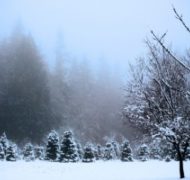Accidental Discovery
Blog / Produced by The High Calling
Have you ever run away from home? Wanted to?
Sounds to me like this is what Gerald May is doing in our latest chapter of his book The Wisdom of the Wilderness: Experiencing the Healing Power of Nature.
In chapter seven, A Perfection of Trees, May flees into the wilderness after a perfectly awful week in a February from hell. He gets caught up in a spiral of negative self-talk and can’t seem to get away from it…no matter how far he runs.
I tried to pray, but all that came out was “Help.” Looking back, I guess that’s about as good and honest as prayer can be, but at the time it felt like yet another failure.
Ever been there?
I know I have. More times than I care to count.
Running away always seems a good answer. For a little while, anyway. But you know the old adage. You can run…but you can’t hide.
May’s self-defeating self-dialogue follows.
It chases him through the snow, slipping, sliding, falling, stumbling up hill, breaking tree limbs as he fights against nature--struggling against himself, it seems.
But something happens as he flails through the snow in his cowboy boots.
As I walked, my mind stopped harassing itself and peacefulness came again--a peacefulness born of the sweet absence of harsh thoughts and the perfect presence of everything around me just being. Such times just happen. There’s no way to make them happen. All you can do, I guess, is put yourself in places where they might happen, want them enough so that the wanting becomes a prayer even if you can’t pray it, and just do what comes naturally.
Even though peace visits, May struggles to hold on to it. He describes the fleeting moment as perfect--where suddenly, everything is exactly the way it should be.
As he studied the forest from a hilltop perch, a pileated woodpecker drew his attention to a copse of trees that appeared dead. May identifies with the trees.
Yeah…I know what it’s like. Done your best and it wasn’t good enough. Old and rotten to the core. Decaying, ugly…
But just as quickly as the thoughts come, May takes a second look.
…when I looked at the trees as individuals I saw all the imperfections of them. Each was broken here and there; all had branches cracked by winds and ice, some split down the middle by lightning; many bore the scars of disease, blighted spots, knots an burls and parasite vines upon them, broken, wounded, growing this way and that, all with their injuries of the years and their imperfections of birth and growth and yet all were absolutely perfect as they were.
May is struck by the subjective nature of what he calls perfection. Once again he identifies with the trees--from quite a different perspective.
It was quite natural, then, to see myself like a tree, imperfect in so many ways and yet, somehow, seen with the eyes of beauty, absolutely perfect.
This is how it always seems to happen, isn’t it? We run away, thinking we are looking for one thing and end up finding something else. An accidental discovery.
May, seeking to escape the parts of himself that cause shame--running away from mistakes he has recently made--instead finds God’s unconditional love. This amazing grace envelops him--imperfections and all.
Food for thought:
**Does the self-talk struggle that May describes surprise you, given all the beautiful insights and experiences he has already written about? Can you think of some Bible characters that may have had some similar psychological setbacks?
**Of a moment of perfection, May says,
Such times just happen. There’s no way to make them happen. All you can do, I guess, is put yourself in places where they might happen, want them enough so that the wanting becomes a prayer even if you can’t pray it, and just do what comes naturally.
What does this mean to you? To put yourself in places where you might be likely to experience moments of perfection? Be specific. Tell us about your special places.
Let's take a little Thanksgiving break next week from our regular book club postings. We'll resume with chapter eight on November 30th. Use this time to listen to your wilderness...and be thankful.
post by Laura Boggess of the Wellspring
photo by Nick Peckover used with permission.





